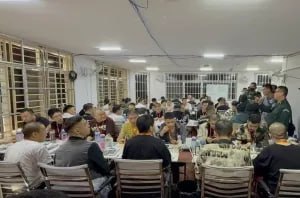
Among the arrested people, 247 were from India. Shockingly, among these 247 Indian suspects, there were 7 suspects suspected of violent coercion of labor. They have long used violence to force others to engage in cybercrime activities, with cruel and vile means. At the same time, 7 Burmese people were also arrested at the scene. After preliminary investigation, they were suspected of illegally detaining victims and fueling the bad behavior of the criminal group. At present, an Indian victim has been investigated in depth by the police as a key witness, and the clues he provided are crucial to the investigation of the case.

According to police investigation, the criminal group's methods of committing crimes are extremely covert and cunning. They use online dating platforms to disguise themselves as sincere and friendly people to communicate with people in the United States, Canada, Europe and other regions, and gradually gain their trust. Once trust is established, they use various seemingly attractive reasons to guide victims to recharge through cryptocurrencies. These so-called investment projects or preferential activities are all fictitious. Once the victims complete the recharge, the criminal group quickly disappears with the money. According to preliminary statistics from the police, the criminal group has made hundreds of millions of dollars in profits through such fraudulent means, causing huge economic losses to many innocent people.

The Cambodian police pointed out in a notice after the operation that the criminal den had long forced a large number of people to participate in cybercrime activities through threats of violence, causing great harm to many victims and their families and seriously disrupting social order .

This operation demonstrates Cambodia's firm determination to combat cross-border crime. After the operation, 239 Indian suspects and 4 Southeast Asian suspects (including 4 of the 7 Burmese suspects mentioned above , and another 3 Burmese suspects were handled differently due to other related crimes) were quickly transferred to the General Department of Immigration and will be further dealt with in accordance with legal procedures.
According to insiders, the criminal group has long been entrenched in the border areas between Cambodia and neighboring countries, taking advantage of the complex terrain and the difficulty of border management to carry out a series of illegal activities such as online gambling and telecommunications fraud. They are well-organized with clear division of labor, and through the Internet, they have extended their evil hands to many countries, posing a huge security risk to the international community.
It is worth noting that in this operation, the proportion of Burmese nationals among the suspects has shown an upward trend. This phenomenon may reveal that new changes are taking place in the Southeast Asian criminal network. Criminal groups may be constantly adjusting their personnel structure and criminal strategies in an attempt to evade the crackdown by police in various countries. Law enforcement agencies in relevant countries need to be highly vigilant of this change, strengthen international police cooperation, jointly respond to new challenges of cross-border crime, and prevent criminal groups from taking advantage of regional differences and loopholes to continue to commit crimes. This Cambodian police operation has provided an important example for combating transnational cybercrime and has made positive contributions to regional security and stability, but there is still a long way to go to combat cross-border crime.
